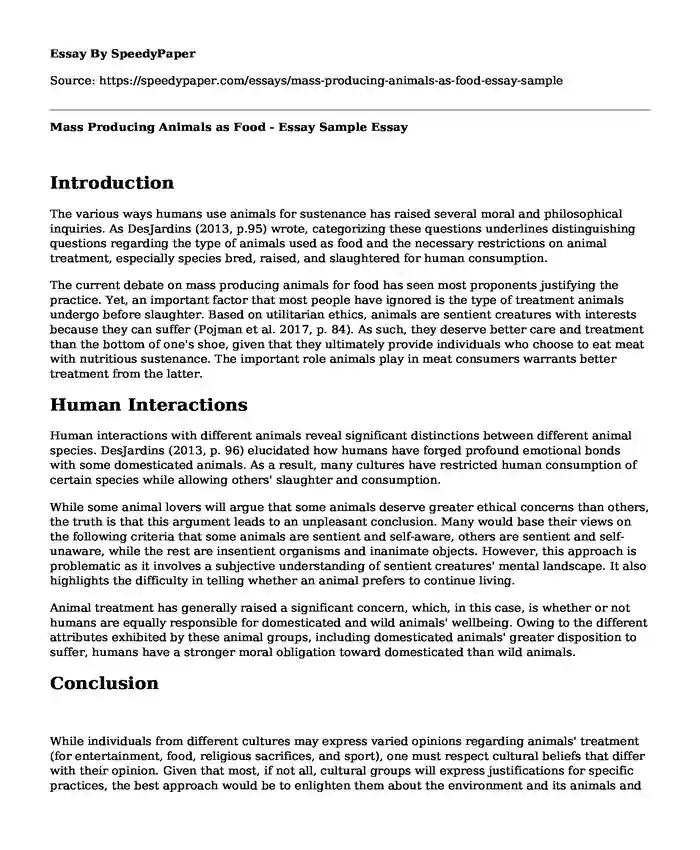
| Type of paper: | Essay |
| Categories: | Animals Ethics Social issue |
| Pages: | 2 |
| Wordcount: | 469 words |
Introduction
The various ways humans use animals for sustenance has raised several moral and philosophical inquiries. As DesJardins (2013, p.95) wrote, categorizing these questions underlines distinguishing questions regarding the type of animals used as food and the necessary restrictions on animal treatment, especially species bred, raised, and slaughtered for human consumption.
The current debate on mass producing animals for food has seen most proponents justifying the practice. Yet, an important factor that most people have ignored is the type of treatment animals undergo before slaughter. Based on utilitarian ethics, animals are sentient creatures with interests because they can suffer (Pojman et al. 2017, p. 84). As such, they deserve better care and treatment than the bottom of one's shoe, given that they ultimately provide individuals who choose to eat meat with nutritious sustenance. The important role animals play in meat consumers warrants better treatment from the latter.
Human Interactions
Human interactions with different animals reveal significant distinctions between different animal species. DesJardins (2013, p. 96) elucidated how humans have forged profound emotional bonds with some domesticated animals. As a result, many cultures have restricted human consumption of certain species while allowing others' slaughter and consumption.
While some animal lovers will argue that some animals deserve greater ethical concerns than others, the truth is that this argument leads to an unpleasant conclusion. Many would base their views on the following criteria that some animals are sentient and self-aware, others are sentient and self-unaware, while the rest are insentient organisms and inanimate objects. However, this approach is problematic as it involves a subjective understanding of sentient creatures' mental landscape. It also highlights the difficulty in telling whether an animal prefers to continue living.
Animal treatment has generally raised a significant concern, which, in this case, is whether or not humans are equally responsible for domesticated and wild animals' wellbeing. Owing to the different attributes exhibited by these animal groups, including domesticated animals' greater disposition to suffer, humans have a stronger moral obligation toward domesticated than wild animals.
Conclusion
While individuals from different cultures may express varied opinions regarding animals' treatment (for entertainment, food, religious sacrifices, and sport), one must respect cultural beliefs that differ with their opinion. Given that most, if not all, cultural groups will express justifications for specific practices, the best approach would be to enlighten them about the environment and its animals and see if the former can revise cultural traditions based on outdated circumstances.
References
DesJardins, J. R. (2013). Responsibilities to the natural world: From anthropocentric to nonanthropocentric ethics. In Environmental ethics: An introduction to environmental philosophy (5th ed., pp.95-122). Cengage Learning.
Palmer, C. (2010). Animal ethics in context. Columbia University Press.
Pojman, L. P., Pojman, P., & McShane, K. (2017). Animal rights. In Environmental ethics: Readings in theory and application (7th ed., pp. 83-128). Cengage Learning.
Cite this page
Mass Producing Animals as Food - Essay Sample. (2023, Dec 25). Retrieved from https://speedypaper.com/essays/mass-producing-animals-as-food-essay-sample
Request Removal
If you are the original author of this essay and no longer wish to have it published on the SpeedyPaper website, please click below to request its removal:
- Free Essay Example on The Everglade Region
- Analysis of the Blackfish Documentary, EssayExample
- Essay Example on the Everglades National Park
- Free Essay. Pros for the Sale of Products by Companies to Disposable Income People
- Essay Example - Hazardous Waste Operations and Emergency Response
- Essay Sample on Drugs and Victimization
- Navigating Ethical Dilemmas: College Students and the Social Media Conundrum - Paper Sample
Popular categories




